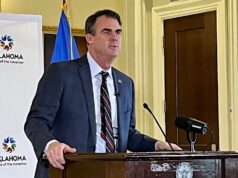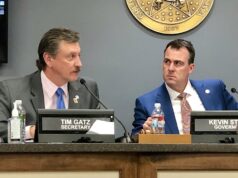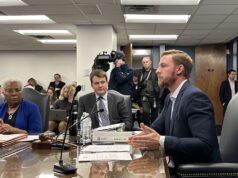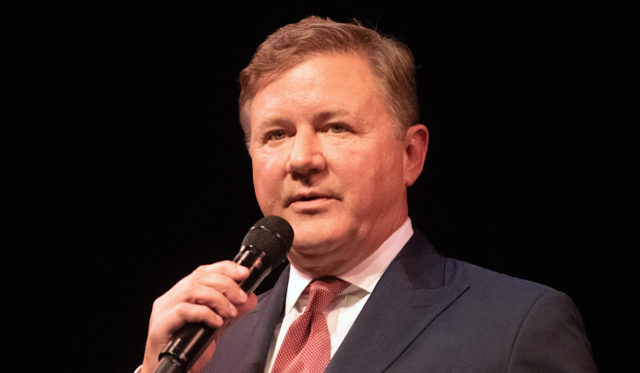
As the Oklahoma Attorney General’s Office prepares for its third leadership change in the last six years, political observers are eager to see how incoming Attorney General Gentner Drummond will focus his energy as the state’s chief law officer.
The following article outlines key staffing decisions and overarching questions faced by Drummond, who is entering public office for the first time after a career serving in the military, working for a U.S. senator and running successful businesses.
Drummond and other statewide officials elected in November are set to be sworn into office on Monday, Jan. 9. (To study the prescribed powers of the Oklahoma Attorney General’s Office, review Chapter 2 of Title 74 of state statute.)
Drummond and his chief of staff spoke with NonDoc on background ahead of this article, although no formal comments were provided regarding any of the topics at hand.
Familiar face: Trebor Worthen as chief of staff
During Drummond’s campaigns to become attorney general — he fell just shy of unseating Mike Hunter in 2018 and barely edged out incumbent John O’Connor in June — longtime political consultant Trebor Worthen has been one of Drummond’s closest advisors.

That will continue as Drummond takes office in 2023, because Worthen is set to become the attorney general’s chief of staff. The decision underscores the likelihood that Drummond considers running in an open race for governor in 2026, but it has other implications as well.
First, Worthen is a former legislator but not an attorney, which could be the sort of latent thought that lingers in staff attorneys’ minds when difficult decisions are being debated among office leaders. While Worthen is savvy enough to know he and Drummond must recruit and rely on veteran prosecutors and litigators, the Attorney General’s Office has a legal and ethical obligation to understand the law and follow it under all circumstances. Even a small failure to do so — as O’Connor learned when his office briefly attempted to argue that natural gas is not petroleum — could impair Drummond’s effort to move the Attorney General’s Office beyond past foibles.
Second, Worthen’s wife, Jenna, is one of the most prominent political fundraisers in Oklahoma, and Drummond’s campaign paid Jenna Worthen’s company — James Martin Company, LLC — more than $174,000 for “strategic consulting” in his 2022 race. With many political observers expecting Drummond to at least prepare for a possible gubernatorial run in 2026, the confluence of staff leadership and political operation bears watching.
Third, Trebor Worthen’s most recent political baggage was forged in the dark money arena as the founder and chairman of Sooner State Leadership Fund, a 501(c)(4) political action committee that spent millions of dollars against Gov. Kevin Stitt in 2022.
Other names you know up for jobs
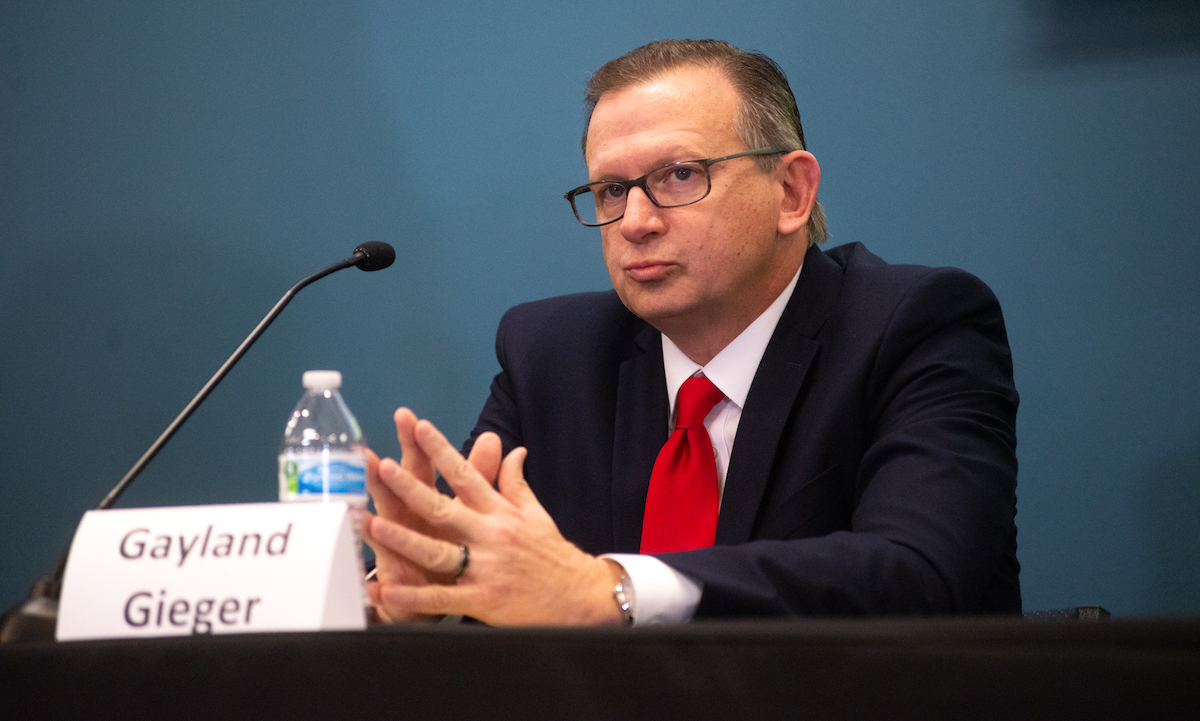
To the extent that John O’Connor partially cleaned house following the tumultuous and political tenure of Mike Hunter, Gentner Drummond is poised to change the flooring, the lighting and the overall mood at 313 NE 21st St.
Gone are First Assistant Attorney General Lori Carter and general counsel Julie Pittman. While official titles have not been announced or confirmed yet by Drummond or Worthen, longtime Oklahoma County Assistant District Attorneys Jimmy Harmon and Gayland Gieger are expected to join the team. It’s possible that one could serve as Drummond’s first assistant, while the other could manage the office’s powerful Multi-County Grand Jury Unit.
The general counsel job in Drummond’s office could be filled by former Sen. Rob Johnson (R-Kingfisher), whose most recent public sector experience has been as a lobbyist for the Oklahoma Automobile Dealers Association and Adobe.
As Drummond puts his band together, the public should also expect to see Phil Bacharach on communications and longtime State Department of Education attorney Brad Clark somewhere in the ensemble.
Key corruption cases in the crosshairs
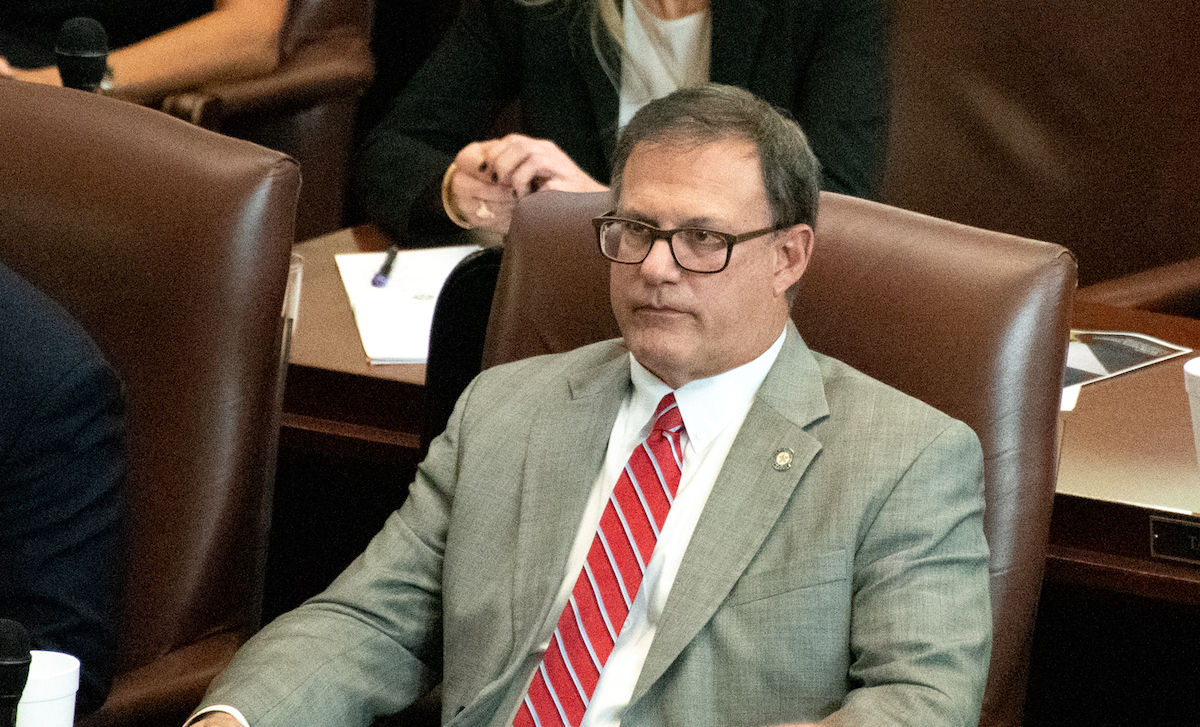
During his campaigns for attorney general, Drummond has expressed frustration with how the state’s top law enforcement office has not acted swiftly and sternly on matters of alleged public corruption. During the tenures of Mike Hunter and John O’Connor, Oklahoma County District Attorney David Prater’s office made significantly more headway on corruption cases than the Attorney General’s Office, something Drummond has said he wants to change.
Five current matters bear watching as Drummond takes office, two of which involve active charges against high-profile individuals: the racketeering and embezzlement cases against the original founders of Epic Charter Schools; and the conspiracy case against Rep. Terry O’Donnell (R-Catoosa).
The Oklahoma State Bureau of Investigations is also leading ongoing inquiries into allegations against former Commissioners of the Land Office Secretary Elliot Chambers and the State Department of Tourism and Recreation’s terminated contract with Swadley’s Foggy Bottom Kitchen. In both situations, OSBI’s investigations were requested by Prater, who termed out of office this week.
Toss in Drummond’s interest regarding how federal COVID relief funding was administered by the Stitt administration and incoming Superintendent of Public Instruction Ryan Walters’ nonprofit, and Drummond’s office will have plenty of high-profile criminal allegations to juggle.
For the cases and investigations currently being handled by the Oklahoma County District Attorney’s Office, Drummond has indicated that he may prefer for his office to take charge of those matters. New Oklahoma County DA Vicki Behenna said this week that she would discuss those specific cases with Drummond after he is sworn into office Monday.
She said she did not know if she preferred to handle any of the corruption cases herself.
“I don’t know the answer to that yet,” Behenna said. “It’s something that AG Drummond and I will discuss.”
State law, however, grants the attorney general the right to assume control over any criminal prosecution in the state, regardless of whether a local district attorney agrees to transfer the case. Title 74, Section 18b states:
To initiate or appear in any action in which the interests of the state or the people of the state are at issue, or to appear at the request of the governor, the Legislature, or either branch thereof, and prosecute and defend in any court or before any commission, board or officers any cause or proceeding, civil or criminal, in which the state may be a party or interested; and when so appearing in any such cause or proceeding, the attorney general may, if the attorney general deems it advisable and to the best interest of the state, take and assume control of the prosecution or defense of the state’s interest therein.
Among the corruption cases at hand, the O’Donnell case likely poses the biggest question mark for Drummond and Behenna to discuss, owing to the case’s complicated background, the involvement of powerful legislative leaders and the Legislature’s ability to cut or increase the Attorney General’s Office budget.
In addition, Worthen — Drummond’s chief of staff — has longstanding relationships with O’Donnell and House Speaker Charles McCall (R-Atoka), O’Donnell’s close friend and a key witness who testified before the Oklahoma County grand jury that indicted O’Donnell. Complicating matters further in terms of politics, McCall is also rumored as a possible 2026 gubernatorial candidate.
A preliminary hearing had been set in the O’Donnell case for Monday, Jan. 9, but earlier this week that was delayed until April. O’Donnell has also filed a motion requesting a legislative continuance, which is pending.
Compact conversations could crescendo

During his 2022 campaign for attorney general, Gentner Drummond had several conversations about potential criminal justice compacts with tribal nations in eastern Oklahoma.
While campaigning against O’Connor, Drummond criticized his opponent for not striking agreements to mitigate the jurisdictional swiss cheese created by the U.S. Supreme Court ruling in McGirt v. Oklahoma, which functionally affirmed eastern Oklahoma as a set of Indian Country reservations where only the tribes and the federal government have prosecutorial jurisdiction over tribal citizens who violate the Major Crimes Act. The situation has complicated law enforcement responses and has created debate over whether nascent tribal justice systems have let some crimes escape prosecution.
In a June debate against O’Connor, Drummond said “the solution is in our hands.”
“We Oklahomans need to solve the Oklahoma problem. The Native American members of Oklahoma are 400,000 strong. They are Oklahomans. They are we,” Drummond said. “We simply need to treat our brothers and sisters with dignity and reach out across the aisle and shake their hands.”
Drummond said he had already met with leaders of 33 of the 39 tribes headquartered in Oklahoma and that they “all want bad people in jail and good people protected.” He outlined “the essence of the agreement they would accept as an intergovernmental agreement from the state of Oklahoma to each individual tribe in an individual capacity.”
First, the agreements must recognize tribal sovereignty, Drummond said. Second, the agreements would cross-deputize district attorneys, sheriff’s departments and police forces in Oklahoma with their overlapping tribal nations.
“Any time we arrest a Native American perpetrator or a non-native who has perpetrated a crime against a native, we notify that respective tribe. They reserve the right to pull them out into the federal system or the tribal system. Otherwise, and so long as we don’t illustrate racism and disparagement, let the state prosecute the bad guys,” Drummond said. “That will do away with our problems, and that will solve the McGirt issue.”
To what extent and with what speed Drummond will attempt to formalize his proposed public safety compacts should be a key question for his administration in 2023. Former Attorney General Mike Hunter attempted to strike similar agreements in 2020 soon after the McGirt decision, but not all of the five primarily affected tribes — the Muscogee, Chickasaw, Cherokee, Choctaw and Seminole nations — were on board at the time.
Drummond, who has known Gov. Kevin Stitt for a long time but who has disagreed with some of the governor’s approach to tribal relations, will need to flex his arbitration abilities if he wants Stitt and tribal leaders to agree to a series of compacts.
Attorney general opinion request backlog
A year’s worth of turmoil that involved the resignation of multi-county grand jury presiding Judge Tim Henderson, the resignation of Attorney General Mike Hunter and the gubernatorial appointment of new Attorney General John O’Connor caused the AG’s Office to issue only one official attorney general opinion in 2021. In 2022, O’Connor’s team published seven attorney general opinions.
Attorney general opinions are issued to legislators and other public officials when they ask questions about the proper interpretation of state law. Once issued, AG opinions function as binding legal guidance until state statute is changed by the Legislature or a court rules on the topic in question.
“Generally, public officials are required to act in accordance with an attorney general opinion unless or until the opinion is set aside by a court,” the Attorney General’s Office website states. “However, opinions that conclude a statute is unconstitutional are advisory only.”
As Drummond takes office in 2023, his office will inherit a backlog of AG opinion requests
In 2020, officials made 37 requests for AG opinions, and the Attorney General’s Office issued 13 opinions that year. In 2021, officials made 24 requests for AG opinions, but the Attorney General’s Office issued only one opinion.
That opinion, 2021-01, stemmed from a July 13, 2020, request from Oklahoma Department of Corrections director Scott Crow, who asked for clarification about the circumstances under which “achievement credits may be awarded” to inmates.
The AG opinions released in 2022 involved:
- When someone convicted of a felony becomes re-eligible to vote (2022-01);
- Whether a county board of equalization can enter into executive session during a property tax valuation protest hearing (2022-02);
- Whether the Board of Tests for Alcohol and Drug Influence is considered a self-sustaining entity (2022-03);
- Whether the Board of Health’s shift to an advisory role violated the Oklahoma Constitution (2022-04);
- Whether counties are required to share equal cost of maintaining highways that fall along county lines (2022-05);
- Whether a company can sell property that it owns without first obtaining a real estate license (2022-06);
- Whether the Statewide Virtual Charter School Board should allow religious-affiliated entities to apply to operate public charter schools (2022-07).
Obtained via open records request in May 2022, the following list outlines the various attorney general opinion requests received by the agency in 2020 and 2021. Dozens of other opinions were requested in 2022.
